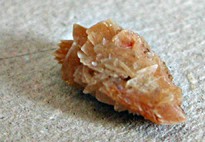KIDNEY STONES TREATMENT FOR DOGS, CATS AND GUINEA PIGS.
Kidney stones, stony deposits, formed in the kidneys, usually consists of strongly concentrated urine. The presence of a kidney stone is called ‘Nefrolithiasis’ in medical terms.
Stones consisting of calcium oxalate are most common. Calcium phosphate and calcium carbonate stones usually occur with an infection of the urine system, as the bacteria cause the urine to become very alkaline, so that phosphates and carbonates tend to form solid crystals. Hyperparathyroidism causes extra secretion of calcium in urine, often leading to the formation of stones.
 |
This results in an increased amount of uric acid in the urine and can lead to the formation of uric acid stones and urate stones. The size of the stones can vary from small crystals to stones that fill up the entire renal pelvic. The kidney stone in the illustration above is 13 mm in diameter (half an inch).
Medium sized stones get stuck easily when they move on to the bladder, especially in the urethra, which cause severe spasms and blood loss in the urine. The kidney stone in the illustration above is 13 mm in diameter (half an inch).
Especially for the treatment of kidney stones, Chinese herbal medicine has developed the formula Lysium. This formula can divide stones into smaller pieces (pulverize them as it were). Lysium can be used to prevent the development of kidney stones. The total treatment lasts for a period of approximately 3 months. The powder can be mixed with food. It can be given long term. It has no long term side effects. Lysium has no abnormal flavour.
Orders placed before 2.30 pm and paid via PayPal will be shipped the same working day with track & trace.
 |
Lysium, 90 tabl. 300 mg | € 23,10 |
 |
Lysium, 180 tabl. 300 mg | € 43,90 |
 |
Lysium, 90 tabl. 1200 mg | € 34,50 |
 |
Lysium, 180 tabl. 1200 mg | € 63,50 |
Lysium= Trade mark
Lysium is a complementary feed based on Chinese herbs. Composition: Lysimachia nummuralia, Lygodium japonicum, Membrame of Henn Egg. Addition: vegetable Sunflower and Leucine. Analytical constituents: raw ash 0,1% crude fat 1,0% rough egg white 1,3% crude fiber 7,8% Natrium 0,4%.
Dosage Lysium: for dog, cat, guinea pig, rodents and other small pets. Suitable for animals of all ages, including puppies and kittens. The herbal formula can be given for a prolonged period. Can be use when the animal is pregnant or weaning. Also use in case of diarrhoea. This formula has no known side effects with either short or long term. Interactions with other herbal formulas from Petherbs or with veterinary medication are not known and therefore this herbal formula can be administered simultaneously with all other products.
| ½ tablet of 300 mg 2 x a day | |
| 1 tablet of 300 mg 2 x a day | |
|
|
|
|---|---|
| ½ tablet of 1200 mg 2 x a day | |
| 1 tablet of 1200 mg 2 x a day | |
| 1½ tablet of 1200 mg 2 x a day | |
| 2 tablets of 1200 mg 2 x a day | |
| 2½ tablet of 1200 mg 2 x a day | |
| 3 tablets of 1200 mg 2 x a day | |
For a guinea pig and rodent is relatively higher than the dosage for cats and dogs. Rodents are herbivores and therefore they need more herbs to get good results.
|
|
|
|
|
|
To administer: with a bit of cheese, meat etc., whatever the animal likes. It is possible to mix it with a bit of food, just make sure everything is eaten.
Result: 1-3 months, depending on the size and number of kidney stones.
Maintenance dose: when your animal is healthy again, you can reduce the dose by 50%.
Preventive dose: 50% of the normal dose.
 |
 |
|




